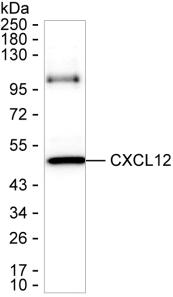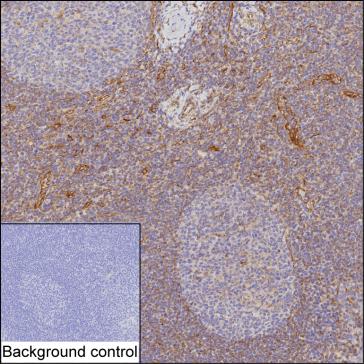

| WB | 咨询技术 | Human,Mouse,Rat |
| IF | 咨询技术 | Human,Mouse,Rat |
| IHC | 1/100-1/200 | Human,Mouse,Rat |
| ICC | 技术咨询 | Human,Mouse,Rat |
| FCM | 咨询技术 | Human,Mouse,Rat |
| Elisa | 咨询技术 | Human,Mouse,Rat |
| Host/Isotype | Mouse IgG2a |
| Antibody Type | Primary antibody |
| Storage | Store at 4°C short term. Aliquot and store at -20°C long term. Avoid freeze/thaw cycles. |
| Species Reactivity | Human |
| Immunogen | Purified recombinant fragment of human CXCL12 |
| Formulation | Purified antibody in PBS with 0.05% sodium azide |
+ +
以下是关于CXCL12抗体的3篇参考文献及其摘要概括:
1. **文献名称**:*Targeting CXCL12 from FAP-expressing carcinoma-associated fibroblasts synergizes with anti–PD-L1 immunotherapy in pancreatic cancer*
**作者**:Feig C. et al. (2013)
**摘要**:该研究利用CXCL12中和抗体阻断胰腺癌模型中癌症相关成纤维细胞(FAP+ CAFs)分泌的CXCL12.发现其可增强T细胞浸润并协同抗PD-L1疗法,显著抑制肿瘤生长。
2. **文献名称**:*CXCL12-neutralizing antibody promotes mobilization of hematopoietic stem cells in a murine model*
**作者**:Broxmeyer H.E. et al. (2005)
**摘要**:研究证明,使用CXCL12中和抗体能够有效动员小鼠骨髓中的造血干细胞进入外周血,揭示了CXCL12/CXCR4轴在干细胞滞留中的关键作用及抗体干预的治疗潜力。
3. **文献名称**:*Anti-CXCL12 antibody alleviates liver fibrosis by modulating inflammatory cell recruitment*
**作者**:Zimmermann H.W. et al. (2011)
**摘要**:通过肝纤维化小鼠模型,研究发现CXCL12抗体可减少单核细胞和中性粒细胞的肝脏浸润,抑制纤维化相关炎症反应,表明靶向CXCL12或为抗纤维化治疗新策略。
4. **文献名称**:*CXCL12 blockade preferentially regenerates aged myogenic progenitors by preventing their migration*
**作者**:García J.M. et al. (2020)
**摘要**:该文献报道CXCL12抗体通过阻断衰老肌肉干细胞(MuSCs)的迁移,促进其局部增殖与组织修复,为衰老相关肌再生障碍提供了治疗思路。
以上研究均聚焦CXCL12抗体的应用,涵盖肿瘤免疫治疗、干细胞动员、纤维化干预及组织再生等领域。
CXCL12. also known as stromal cell-derived factor-1 (SDF-1), is a chemokine that plays critical roles in cell migration, immune regulation, and tissue homeostasis by binding to its receptors CXCR4 and CXCR7. It is involved in embryogenesis, hematopoietic stem cell homing, angiogenesis, and cancer metastasis. Antibodies targeting CXCL12 are essential tools for detecting and studying its expression, localization, and function in physiological and pathological contexts. These antibodies are widely used in techniques such as immunohistochemistry (IHC), flow cytometry, Western blotting, and ELISA to quantify CXCL12 levels in tissues, serum, or cell cultures.
CXCL12 antibodies are typically developed in host species like rabbits or mice, with monoclonal antibodies offering high specificity for distinct epitopes and polyclonal antibodies providing broader detection across isoforms (e.g., CXCL12α, β, γ). Their applications span cancer research, particularly in studying tumor microenvironment interactions, metastasis, and resistance mechanisms. For example, CXCL12/CXCR4 axis inhibition is explored as a therapeutic strategy, and antibodies help validate target engagement in preclinical models. Additionally, they aid in understanding inflammatory diseases, HIV infection (where CXCR4 acts as a co-receptor), and stem cell biology.
Quality validation of CXCL12 antibodies includes specificity testing via knockout controls or blocking peptides. Their utility in both diagnostic (biomarker detection) and therapeutic (neutralizing antibodies) contexts underscores their importance in biomedical research and drug development.
×